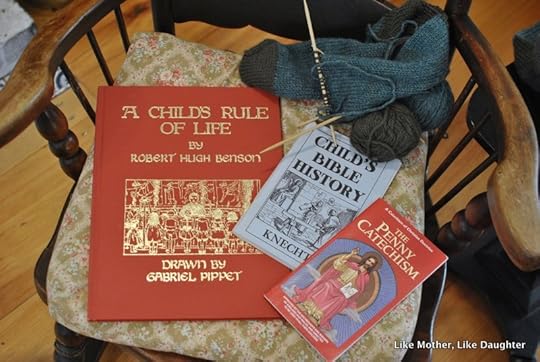The moral life of the child and how to nurture it. Part 3.
So far in this series:
Part 1: Only the moral life can bring happiness, and suffering is part of the journey.
Part 2: Resources for and thoughts on teaching the Ten Commandments.

As I take down the Christmas decorations (a days’ long process, and not a pretty sight), I am so happy that I remembered to order some paper whites to help me greet the emerging sunniness!
My recent reading has converged on this idea we are discussing, of the moral development of children. Well, of course it seems that way to me, since our moral life is intrinsic to our nature — we were made to be good, to respond to goodness, to love the good. So naturally, everything reminds me of this beautiful truth!
We did suffer the Fall, and thus there is a division introduced into life, where we have trouble with being good — trouble for ourselves and when it comes to teaching our children. But if you pay close attention to the readings at Mass, you will see how often the Church brings our attention back to loving God’s law.
The other day was noticing the familiar reading from the Divine Office on the Feast of St. Anthony, taken from the sixth chapter of Deuteronomy:
The law of love
These are the words that Moses spoke beyond Jordan to the whole of Israel:
Listen, Israel: the Lord our God is the one Lord. You shall love the Lord your God with all your heart, with all your soul, with all your strength. Let these words I urge on you today be written on your heart. You shall repeat them to your children and say them over to them whether at rest in your house or walking abroad, at your lying down or at your rising; you shall fasten them on your hand as a sign and on your forehead as a circlet; you shall write them on the doorposts of your house and on your gates.
When the Lord has brought you into the land which he swore to your fathers Abraham, Isaac and Jacob that he would give you, with great and prosperous cities not of your building, houses full of good things not furnished by you, wells you did not dig, vineyards and olives you did not plant, when you have eaten these and had your fill, then take care you do not forget the Lord who brought you out of the land of Egypt, out of the house of slavery. You must fear the Lord your God, you must serve him, by his name you must swear.
Do not follow other gods, gods of the peoples round you, for the Lord your God who dwells among you is a jealous God; his anger could blaze out against you and wipe you from the face of the earth. Do not put the Lord your God to the test as you tested him at Massah. Keep the commandments of the Lord your God and his decrees and laws that he has laid down for you, and do what is right and good in the eyes of the Lord so that you may prosper and take possession of the rich land which the Lord swore to give to your fathers, driving out your enemies before you; this was the promise of the Lord.
In times to come, when your son asks you, “What is the meaning of the decrees and laws and customs that the Lord our God has laid down for you?” you shall tell your son, “Once we were Pharaoh’s slaves in Egypt, and the Lord brought us out of Egypt by his mighty hand. Before our eyes the Lord worked great and terrible signs and wonders against Egypt, against Pharaoh and all his House. And he brought us out from there to lead us into the land he swore to our fathers he would give to us. And the Lord commanded us to observe all these laws and to fear the Lord our God, so as to be happy for ever and to live, as he has granted us to do until now. For us right living will mean this: to keep and observe all these commandments before the Lord our God as he has directed us.”
Responsory
℟. The law of the Lord is perfect: it revives the soul. The rule of the Lord is to be trusted, it gives wisdom to the simple.* The command of the Lord is clear, it gives light to the eyes.
℣. He who loves his neighbour has satisfied every claim of the law: the whole law is summed up in love.* The command of the Lord is clear, it gives light to the eyes.
And it’s on hearing the Gospel of the Rich Young Man (the reading for his feast, Matthew 19:16-26 — all the readings for his Mass are here) that St. Anthony sold all he had and basically founded monasticism.
“Let these words I urge on you today be written on your heart. You shall repeat them to your children… ”

At the moment, I’m reading a fascinating book about a gentleman who is a favorite here, John Senior. I’ve come to the part where he is realizing that he is not succeeding as a professor when he, so to speak, brings his students to the waters of Thomas Aquinas and expects them to drink.
The modern student, the student who lacks basic human formation, simply cannot.
Senior sees that their inability — not only to understand the text, but even to be sparked by the light of knowledge — has to do with a lack of imagination and connection with reality. From the book:
“The Summa Theologiae [the text by Thomas Aquinas he wants them to read] contains clear refutations of reasonable heresies [by this he means simple errors] but scarcely touches anyone who disbelieves in the very difference between truth and error.” Senior found that his students simply did not recognize “the absolute difference between ‘is’ and ‘is not.’ “
This he calls an “unreasonable” heresy — there is no reasoning with a person in this condition, as they have not the faculty of reasoning.
As I mentioned long ago here on this blog when I was trying to stress the importance of disciplining children, this basic habit of “liking and disliking what he ought” must be nurtured in a child when he is very young, as the ancients tell us, or else he arrives at this pitiable state of not being able to move on to abstract reasoning. He becomes impervious to moral thought, and hence, to moral action. He is at the mercy of his appetites — or, more seriously, of the will of those who are more powerful than he.
This fundamental observation explains why I pretty much despair when someone remarks that the trouble with the state of marriage in our society is the state of “marriage prep,” as if a class during the weeks before the wedding can rectify a lifetime of moral neglect.
The reality is that the proper formation takes the form of organic life, directed by loving parents and teachers — not a program.
Senior came to change his approach to teaching, realizing that the student’s preparation takes place outside the classroom and long before he arrives there, if his mind is to be open to truth.
The child, briefly stated, has to be connected to reality at an early age, or the chances that he will be able to function as a free adult (freedom being precisely the ability to control oneself morally) will be low; far less will he be able to tackle intellectually rich fare later in life.
But even if a person doesn’t go on to study philosophy, his life will be destroyed by the “unreasonable” heresy — the failure to know that good and truth, above all, exist.
In education, Senior says, “Learning is gradual and first things must come first.”

So I keep coming back to this.
When your children are very young, you might not think you are giving them a moral education by nurturing their imaginations with good stories; their senses with good contact with the world as it is outside, in the fresh air, under the stars; and with your loving (and sometimes exasperated) insistence that they not be naughty but that they try to be good. It all seems so messy, and so slow, and so very, very unproductive,
But you are; you are nurturing them.
You are nurturing the moral life when you say to your three-year-old, “Go wash your hands,” and he comes back in a minute and says, “I did,” but you see that he didn’t, so you say, “Don’t be naughty — when I tell you to wash your hands, you must do it”; when you say, “Don’t hit your brother, that’s naughty — go help him climb that thing”; you are establishing reality for them, in the only way they can apprehend it, through you. Don’t forget that God is Father. He gives us earthly fathers so that we can come to know Him.
“We are a rooted species,” Senior wrote, “rooted through our sense in the air, water, earth, and fire of elemental experience.”
I would add: and through our fundamental relationships in the family!
Later, around the age of reason, when the child has the habit of obeying and has a growing awareness that the world is a big place, you can start the gentle process of acquainting him with God’s law — helping him lift his eyes up from his mother and father to the universe that awaits him.
Here are a few more resources for you.
As your child moves out of Bible stories and into reading actual Scripture, the Child’s Bible History will help him to grasp the overall sweep of Salvation History. This book is not a Bible and it’s not a catechism, but it’s very helpful for understanding both. Use the questions after each section as prompts for discussion — a simple narration of the text will be fine and fix it in his memory.
The Penny Catechism is a supplement to the Baltimore Catechism I have recommended in the other posts. It’s really helpful for an adult too. Honestly, this little book is worth a million motivational volumes about becoming a dynamic Christian etc etc. What we need is for our consciences to become informed, and the Holy Spirit will do the rest.
At the back of the Penny Catechism you will find helpful prayers and a short “Christian’s Rule of Life.” What is a rule of life? It’s simply the few habits that you want to have to stay on track. Contrary to what you may think, it’s not at all burdensome or anxiety-producing to have a “rule,” far less is it complicated — it’s simple and freeing, especially when you realize that you just choose one thing at a time to concentrate on, perhaps mentioning it to your spiritual director (usually the priest you go to Confession with).
For a child, I hope you can find this charming book A Child’s Rule of Life. Robert Hugh Benson gently and poetically shows the child what “a day in the life” looks like. A quick search doesn’t turn it up for sale, but you might come across it in a second-hand shop. It’s very sweet. You may be able to order it here.
The post The moral life of the child and how to nurture it. Part 3. appeared first on Like Mother Like Daughter.



